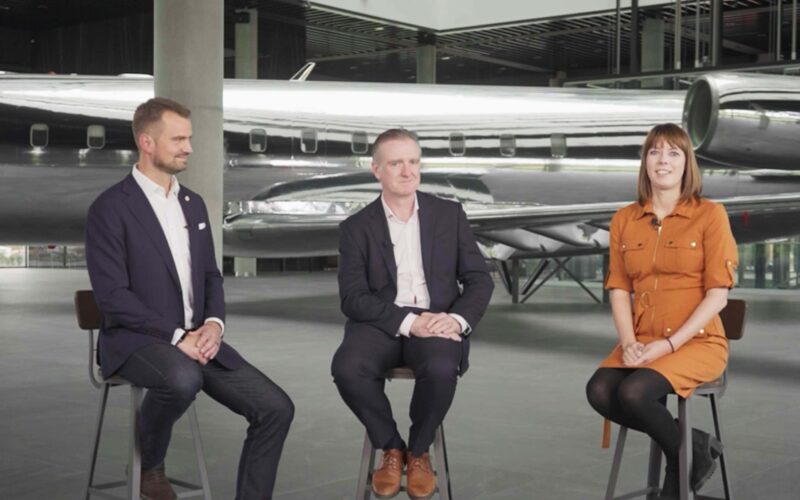A global pandemic, followed by war in Europe, staffing problems and a cost-of-living crisis. You’d be forgiven for thinking it’s all doom and gloom for aviation companies. But JETMS, the global provider of integrated world-class aircraft solutions, has found growth opportunities and is keen to take on new people to help support its ongoing expansion plans.
In a new monthly videocast, produced by the AeroTime Studio, JETMS CEO Vytis Zalimas and Keiron McNeill, managing director at JETMS Completions, discuss the challenges and opportunities.
“The great thing is that the industry is very busy right now – there’s lots of flights going on and maintenance organizations are also fully booked. So that is a good thing,” Zalimas explains. “But from another perspective, I can feel that the pace is slowing down just because the industry lost a lot of talent. And now we all need to think how to gain them back in order to move forward even faster.”
A shift to the west?
So, how has JETMS, which provides maintenance, aircraft painting, interior and exterior refurbishment, managed to grow during arguably the biggest downturn the aviation industry has ever seen?
For Zalimas, the answer is down to a decision to change the geographical focus, made before the war in Ukraine: “We shifted our location from east to west, we found several huge customers who decided to trust us and they have chosen us as a preferred supplier.” That means JETMS’s hangar in Vilnius, Lithuania is now booked until spring 2023.
WATCH NOW: The new JETMS JETCAST investigates the future of our industry (produced by the AeroTime Studio).
The purchase of JETMS Completions (previously RAS Completions) based at Biggin Hill, a busy business aviation airport in the south of England, in 2021 also proved a fortuitous decision. With commercial traffic all but grounded during the pandemic and people looking for more exclusive ways to travel for health reasons, business aviation has been booming, comments McNeill, who heads the UK operation.
“We’ve seen a lot of traffic growth in that area all through the pandemic. There’s a lot of interest in the whole southeast of England, whether that’s new OEM [original equipment manufacturer] traffic coming in, a lot more customers coming, more interest from business jet operators, such as NetJets, VistaJet and people like that. That market’s very strong.”
The people puzzle
One thing both Zalimas and McNeill are keen to do is attract more young people into aviation as a career. The pandemic means that people have left the industry for more stable options, while Brexit has resulted in challenges with talent leaving the UK for Europe.
“Historically, there was no shortage of applicants to go into aviation,” McNeill comments. “It’s a fantastic industry. Now aviation has to rethink its model. How do you attract talent, especially skilled design talent, engineering talent, where they can go to Formula 1?”
Zalimas agrees. “When we look further to support our growth, we need to win people from other industries – the telco and car industries, even the furniture industry. If we think about production of interiors, it’s a fight for talent.”
For McNeill, who has spent his whole career in aviation, it’s about showing people that aviation can offer a varied and challenging career path, describing it as a “spider web”.
McNeill says he has worked across “every facet” of engineering and feels that should be an attractive proposition to any young person. He warns that you might get the bug for aviation though!
“Who knows what part of the industry you will end up in? The key part for us is to keep them in the industry, and don’t stop people progressing, because they may just move out. Let’s assist them to move sideways, forwards. Everybody I know in aviation who has stayed has moved across the whole breadth of the industry. And that’s why it becomes a very mild obsession, I think for all of us.”
Zalimas lights up when asked to describe why the aviation industry is the place to be.
“It’s romantic, it’s global, it’s multinational, lots of traveling, lots of fun,” he enthuses. “I’ve been in telcos, in the banking industry and in aviation. I left and I was missing a lot. So I came back.”
Vytis Zalimas, CEO of JETMS, Keiron McNeill, managing director at JETMS Completions
New markets
After the acquisition in the UK, JETMS is keen to keep growing, both organically and via acquisition. For example, the company is planning to expand its hangar space in Lithuania or grow its existing services portfolio, Zalimas explains. However, he is aware that expanding too fast could be risky, so he says JETMS is working to be “as good as we can be in our home bases” before taking the next steps.
Zalimas said JETMS hopes to enter markets in the United States, Asia Pacific and the Middle East: “My personal dream is the United States, which accounts for 60-70% of the business aviation market. Every player should be there, one way or another.”
A move into commercial interiors, complementing the current focus on business jet interiors, is also on the radar.
First things first though. JETMS is planning to expand operations at Biggin Hill “quite dramatically”, says McNeill. JETMS has purchased a new facility, which will allow it to grow operations there. Clients are also enquiring whether JETMS can move into Farnborough, another major business aviation hub in the region.
“We are being asked to move into Farnborough by some quite large clients, which, of course, we’re happy to do, especially during this economic downturn,” McNeill says. “But it’s a bit of a strange industry, because whilst all the indicators are moving backwards, we’re powering forwards. Our growth will definitely outstrip any of the economic pressures that we’re seeing,” he predicts.
A shift to sustainable interiors
With pressure on the aviation industry to reduce carbon dioxide emissions, sustainability is a hot topic and JETMS is no exception.
Sustainable aviation fuels are, of course, a big issue for customers, McNeill says. But owners of business jets are seeking ways to incorporate more sustainable products into their aircraft and this will be a big change for companies like JETMS over the next five to 10 years.
“We’re seeing a lot of pressure in the industry now, to work with manufacturers to create the next generation of sustainable materials to be used.”
Zalimas also says there are other things JETMS can do as a company, such as switching to electric cars, making use of video meetings, and simple things such as turning off office lights at the end of the day.
JETMS can also help with ensuring old aircraft are not just sent to landfill, and that spare parts from end-of-life aircraft are reused. In Vilnius, JETMS took an old Bombardier CRJ 200 business jet and turned it into a piece of art, where it sits proudly in the Avia Solutions Group office building. You can read more about that project in an upcoming feature.
“It’s a beautiful example which makes us smile every day,” Zalimas concludes.
You can listen to the new AeroTime Studio production of JETMS JETCAST here.


